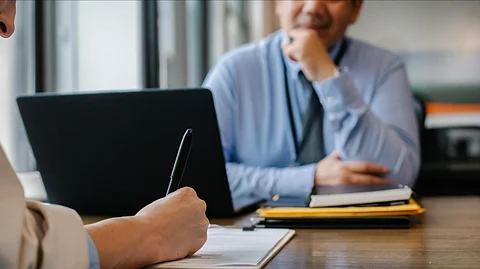
- Union Budget 2026
- Home
- NewsGram USA
- India
- न्यूजग्राम
- World
- Politics
- Entertainment
- Culture
- Lifestyle
- Economy
- Sports
- Sp. Coverage
- Misc.
- NewsGram Exclusive
- Jobs / Internships

After finishing school, graduating, or reaching a point in life where you’re ready to step into the professional world, facing your first job interview can feel overwhelming. It’s natural to be nervous, but every successful career begins with a first step. That one interview could open doors to countless opportunities in the future, so think of it as the start of your journey rather than something to fear.
Your first interview may seem intimidating, especially if you’ve just transitioned from school or college and are new to the professional environment. Feeling unsure or inexperienced is completely normal. To help you prepare with confidence and make a strong impression, here are some simple yet effective tips you can follow to turn your first job interview into a valuable and potentially career-changing experience.
Read the job description carefully because it will help you understand what the employer is looking for and prepare better for the interview. This way, you can focus on sharing the skills and experience that are most useful to them, saving both your time and the interviewer’s. It will also help you answer common questions like, “Do you know about our website?” and show the interviewer that you are genuinely interested in the job.
Based on all the research you have done about the company, organize the documents that can strengthen your chances of getting the job. These may include certificates, offer letters, experience letters from previous employers, or letters of recommendation from people you have worked with in a similar field. Additionally, keep your social media profiles updated, as employers often review them to get an idea of your skills and professional background.
Change your CV according to the job description. Including every single skill or experience you have, even if unrelated to the role, is not helpful and won’t take you far. Instead, tailor your CV for each interview by adding or removing information based on what the company is looking for. You can also adjust the style of your CV to match the job profile.
Interviewers often ask questions about your CV, so study it thoroughly. Avoid adding skills or hobbies you don’t actually possess, as this could lead to questions you can’t answer. Additionally, prepare a short introduction about yourself and the work you’ve done in the past, as this is a common question in most interviews.
After thoroughly researching the company and understanding its operations, you can anticipate the type of questions an interviewer may ask. Prepare a list of potential questions related to the company, as being well-prepared boosts your confidence. Here are some common examples:
Q1: Tell us about yourself.
Q2: What do you know about our company?
Q3: Why do you want to work for this company?
Q4: What are your expectations from the company?
Q5: What are your strengths and weaknesses?
Q6: What is your expected salary?
Wear something that makes you feel comfortable and confident, preferably formal attire suitable for an interview. Ensure your clothes are clean, wrinkle-free, and well-fitted. If you plan to use deodorant or perfume, keep it mild. Maintain a neat appearance with well-groomed hair and a shaved or trimmed beard. Avoid wearing excessive accessories to keep your look professional and formal. Prepare your outfit a day in advance to avoid last-minute delays and ensure you arrive on time for the interview.
Before the interview, try to arrive a little earlier than your scheduled time. This will give you enough time to settle down, prepare mentally, and avoid feeling rushed. Once you enter the interview location, turn off your phone completely. Avoid using social media or engaging in any distractions—keep your mind focused and calm. Maintaining silence and concentration will help you stay composed and confident during the interview.
During an interview, confidence and body language are often just as important as your answers. Be firm and composed while speaking to the interviewer. Start practicing professionalism the moment you enter the company premises—interact politely with the receptionist or HR executive, greet them with a natural smile, and maintain a confident posture. Avoid being overly friendly or overly expressive; instead, stay professional, calm, and composed throughout the process.
If you don’t understand a question the interviewer has asked for any reason, politely ask them to repeat or clarify it. Sometimes, due to nervousness, you might hesitate, thinking it will make you look unprepared or unintelligent—but that’s not true. It’s always better to ask for clarification than to risk giving an irrelevant or incorrect answer. Stay confident and calmly request the interviewer to repeat or rephrase the question.
If you haven’t heard back from the HR department within 5 to 7 days after your interview, politely follow up to inquire about the status of your application. Staying in touch helps keep you on the employer’s radar, as many candidates may be applying for the same position, and your application could otherwise get overlooked. A polite follow-up also shows that you are genuinely interested in the role. When you reach out, you can ask for feedback on your interview performance and remain open to constructive criticism, even if it’s not entirely positive.
After completing your interview and requesting feedback, take some time to reflect on your performance. Think about the mistakes you made, the areas where you did well, and note them down. This self-assessment will help you prepare better for future interviews. Remember, constant improvement is key to personal and professional growth. Even if you are selected for the job, revisiting your interview experience is important, as there is always room for learning and development. [Rh/VP]
